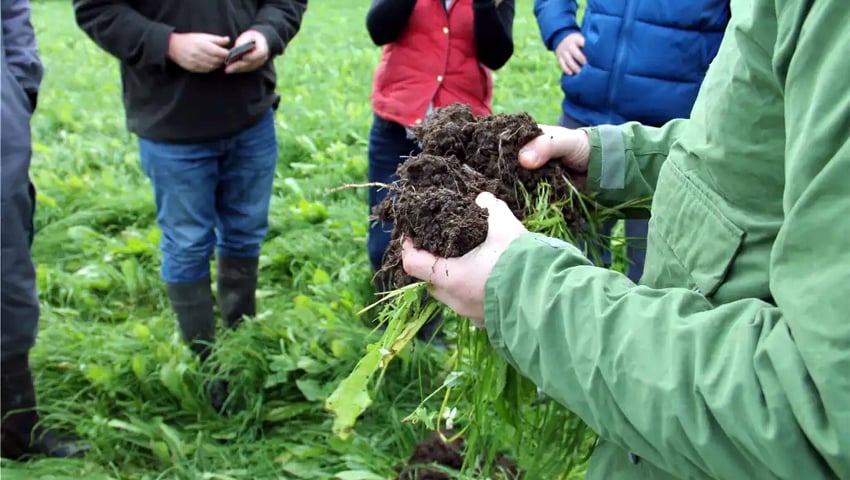A NEW Horizon Europe funded project aims to create a digital platform compiled using Artificial Intelligence (AI) to provide a comprehensive assessment of soil health across Europe to support the Commission’s objective of transitioning towards healthy soils by 2030.
AI4SoilHealth will provide an effective Soil Health Index certification system to support landowners and policy makers under the new Green Deal for Europe. They will also launch a free app to help farmers and growers make changes in their farming practices.
The Soil Association estimates that between 60 and 70% of the EU’s soils are unhealthy. Healthy soils capture carbon, improve yields, help reduce flooding and boosts biodiversity – but they are under pressure from current farming practices and the increasing demand for food.
They say that to reverse this we need to understand which farming practices work and which do not work to restore soil health. The climate crisis leaves little room for mistakes as soil is complex – we need the ability to map changes into the future so we can make the right plan for the right locality. To do this we need to equip land managers and policy makers with the right tools to give them confidence to make the changes to their farming practices which will help improve soil health and resilience.
The project will create and maintain an open access European-wide digital infrastructure, compiled using state-of-the-art AI methods combined with new and deep soil health understanding and measures. Over the next three years the 28 partners in 11 EU countries will collect data from farms and pilot sites across Europe to build a model for this to work from. Along the way they will share their learnings, educating people about the latest soil health measurement techniques and sharing stories from the soil practitioner community.
To help spread the knowledge the partners have worked with their UK communication partners – the Soil Association – to create a new website which shares the AI4SoilHealth mission, latest news, events and partner profiles.
Professor Mogens H. Greve from the Department of Agroecology at Aarhus University said, “We are at a crossroads; we need to do something if we are to preserve European and global soil resources. It is a paradox that on the one hand soil is part of the solution to reduce greenhouse gas emissions, and at the same time 60-70% of Europe’s soil is not doing well. It is therefore imperative that we have better monitoring of soil quality.
“We will develop and maintain a digital infrastructure with free access across Europe. The aim is that the infrastructure will be used to assess and continuously monitor soil health in relation to its management.
“By 2028, all land managers should have access to verified data on CO2 emissions and removals. In addition, the ambition is for agriculture to have an increased focus on carbon storage and thereby contribute to meeting the 2030 target of a reduction in climate impact of 310 million tonnes CO2eq for the entire soil sector in the EU.”
The project demands a multi-layered approach with seven key work-streams including: policy and stakeholder engagement, development of soil health methodology and standards, developing field and laboratory solutions for observations and measurement, and harmonization across the EU-wide soil monitoring services. It will also utilise pilot models in several countries running field trials to establish user testing and feedback and building communication tools to develop campaign and educational to promote awareness and adoption.
Ichsani Wheeler, OpenGeo Hub Foundation said, “Only farmers and land managers are the agents of change in a landscape. As an open-source community of researchers, we hope that by surfacing existing and cutting-edge soil information through space and time, we can cultivate and environment of self-determination for farmers, to the benefit of all of our children.”
Horizon Europe is the EU’s key funding programme for research and innovation with a budget of €95.5 billion. It tackles climate change, helps to achieve the UN’s Sustainable Development Goals and boosts the EU’s competitiveness and growth by funding different types of collaborative projects. The AI4SOILHealth is one of Horizon’s key Research and Innovation Action (RIA) projects which seeks to fund the establishment of new knowledge, explore new or improved technology and solutions.
